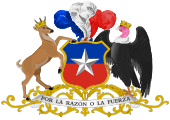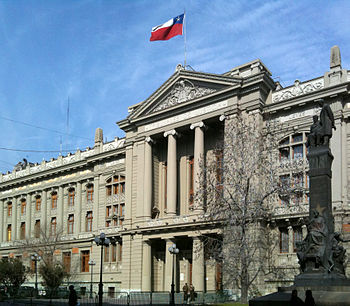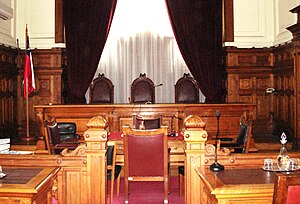Universal jurisdiction is a legal principle that allows states or international organizations to claim criminal jurisdiction over an accused person regardless of where the alleged crime was committed, and regardless of the accused's nationality, country of residence, or any other relation to the prosecuting entity. Crimes prosecuted under universal jurisdiction are considered crimes against all, too serious to tolerate jurisdictional arbitrage. The concept of universal jurisdiction is therefore closely linked to the idea that some international norms are erga omnes, or owed to the entire world community, as well as to the concept of jus cogens – that certain international law obligations are binding on all states.
A court-martial or court martial is a military court or a trial conducted in such a court. A court-martial is empowered to determine the guilt of members of the armed forces subject to military law, and, if the defendant is found guilty, to decide upon punishment. In addition, courts-martial may be used to try prisoners of war for war crimes. The Geneva Conventions require that POWs who are on trial for war crimes be subject to the same procedures as would be the holding military's own forces. Finally, courts-martial can be convened for other purposes, such as dealing with violations of martial law, and can involve civilian defendants.

The High Court of Justiciary is the supreme criminal court in Scotland. The High Court is both a trial court and a court of appeal. As a trial court, the High Court sits on circuit at Parliament House or in the adjacent former Sheriff Court building in the Old Town in Edinburgh, or in dedicated buildings in Glasgow and Aberdeen. The High Court sometimes sits in various smaller towns in Scotland, where it uses the local sheriff court building. As an appeal court, the High Court sits only in Edinburgh. On one occasion the High Court of Justiciary sat outside Scotland, at Zeist in the Netherlands during the Pan Am Flight 103 bombing trial, as the Scottish Court in the Netherlands. At Zeist the High Court sat both as a trial court, and an appeal court for the initial appeal by Abdelbaset al-Megrahi.

A prosecutor is a legal representative of the prosecution in states with either the common law adversarial system or the civil law inquisitorial system. The prosecution is the legal party responsible for presenting the case in a criminal trial against the defendant, an individual accused of breaking the law. Typically, the prosecutor represents the state or the government in the case brought against the accused person.

Under the Constitution of Finland, everyone is entitled to have their case heard by a court or an authority appropriately and without undue delay. This is achieved through the judicial system of Finland.

The Judiciary of Russia interprets and applies the law of Russia. It is defined under the Constitution and law with a hierarchical structure with the Constitutional Court and Supreme Court at the apex. The district courts are the primary criminal trial courts, and the regional courts are the primary appellate courts. The judiciary is governed by the All-Russian Congress of Judges and its Council of Judges, and its management is aided by the Judicial Department of the Supreme Court, the Judicial Qualification Collegia, and the Ministry of Justice, and the various courts' chairpersons. And although there are many officers of the court, including jurors, the Prosecutor General remains the most powerful component of the Russian judicial system.

The judicial system of Turkey is defined by Articles 138 to 160 of the Constitution of Turkey.

The judicial system of Israel consists of secular courts and religious courts. The law courts constitute a separate and independent unit of Israel's Ministry of Justice. The system is headed by the President of the Supreme Court and the Minister of Justice.

The High Court of Singapore is the lower division of the Supreme Court of Singapore, the upper division being the Court of Appeal. The High Court consists of the chief justice and the judges of the High Court. Judicial Commissioners are often appointed to assist with the Court's caseload. There are two specialist commercial courts, the Admiralty Court and the Intellectual Property Court, and a number of judges are designated to hear arbitration-related matters. In 2015, the Singapore International Commercial Court was established as part of the Supreme Court of Singapore, and is a division of the High Court. The other divisions of the high court are the General Division, the Appellate Division, and the Family Division. The seat of the High Court is the Supreme Court Building.
In France, a cour d'assises, or Court of Assizes or Assize Court, is a criminal trial court with original and appellate limited jurisdiction to hear cases involving defendants accused of felonies, meaning crimes as defined in French law. It is the only French court that uses a jury trial.

The judicial system of Egypt is an independent branch of the Egyptian government which includes both secular and religious courts.

The courts of appeal are the main appellate courts in the judicial system of Belgium, which hear appeals against judgements of the tribunals of first instance, the enterprise tribunals and the presidents of those tribunals in their judicial area. There are five courts of appeal for each of the five judicial areas, which are the largest geographical subdivisions of Belgium for judicial purposes. The division of the Belgian territory into the five judicial areas is laid down in article 156 of the Belgian Constitution. A judicial area covers multiple judicial arrondissements ("districts"), except for the judicial area of Mons. Each arrondissement has a tribunal of first instance. Further below, an overview is provided of the five courts of appeal and the judicial arrondissements their judicial area covers. It is important to note that the courts of appeal do not hear appeals against judgements of the labour tribunals; these are heard by the courts of labour.

The Public Prosecutor's Office is the Brazilian body of independent public prosecutors at both the federal and state level. It operates independently from the three branches of government. It was once referred to by constitutional lawyer and former president Michel Temer as a "Fourth Branch". The Constitution of 1988 divides the functions of the Public Prosecutor's Office into three different bodies: the Public Procurator's Office, the Public Defender's Office and the Public Prosecutor's Office itself, each one of them an independent body. In addition to that, the new Constitution created the Federal Court of Accounts, which is also autonomous in its functions.

The court of assizes is the trial court which tries the most serious crimes in the judicial system of Belgium. It is the highest Belgian court with criminal jurisdiction; as such, it is the only Belgian court that can sentence someone to life imprisonment. The courts of assizes are not permanent courts; a new court of assizes is assembled for each new trial. There is a court of assizes in each of the ten provinces of Belgium, as well as one in the arrondissement of Brussels-Capital which is not part of any province. Further below, an overview is provided of the eleven courts of assizes and their seats. They are the only courts in Belgium for which the provinces are used as territorial subdivisions. They are also the only courts in Belgium that hold jury trials. The jury acts as sole trier of fact, but decides on the penalty together with the judges. The trial by jury of certain crimes is laid down in article 150 of the Belgian Constitution. The Belgian courts of assizes have the same origin as their French namesakes.

The Judiciary of Spain consists of Courts and Tribunals, composed of judges and magistrates (Justices), who have the power to administer justice in the name of the King of Spain.

The judicial system of Sweden consists of the law of Sweden and a number of government agencies tasked with upholding security and rule of law within the country. The activities of these agencies include police and law enforcement, prosecution, courts, and prisons and other correctional services.
An examining magistrate is a judge in an inquisitorial system of law who carries out pre-trial investigations into allegations of crime and in some cases makes a recommendation for prosecution. Also known as an investigating magistrate, inquisitorial magistrate, or investigating judge, the exact role and standing of examining magistrates varies by jurisdiction. Common duties and powers of the examining magistrate include overseeing ongoing criminal investigations, issuing search warrants, authorizing wiretaps, making decisions on pretrial detention, interrogating the accused person, questioning witnesses, examining evidence, as well as compiling a dossier of evidence in preparation for trial.

The military courts of the United Kingdom are governed by the Armed Forces Act 2006. The system set up under the Act applies to all three armed services: the Royal Navy (RN), the British Army, and the Royal Air Force (RAF), and replaces the three parallel systems that were previously in existence.

The Judiciary of Burundi is the branch of the Government of the Republic of Burundi which interprets and applies the laws of Burundi to ensure impartial justice under law and to provide a mechanism for dispute resolution. The independence of the judiciary is guaranteed by the constitution.
The Judiciary of Cambodia is independent from the rest of the government of Cambodia, as specified by the Cambodian Constitution. The judiciary follows civil law tradition, the instruction being entrusted to a judge and the prosecutors contenting themselves with requesting the application of the law.




















